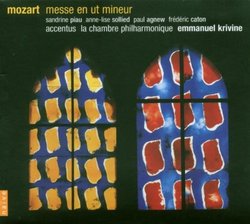| All Artists: Wolfgang Amadeus Mozart, Emmanuel Krivine, La Chambre Philharmonique, Accentus, Laurence Equilbey, Sandrine Piau, Anne-Lise Sollied, Paul Agnew, Frédéric Caton Title: Mozart: Mass in C Minor K 427 Members Wishing: 0 Total Copies: 0 Label: Naive Original Release Date: 1/1/2006 Re-Release Date: 2/21/2006 Genre: Classical Styles: Opera & Classical Vocal, Chamber Music, Historical Periods, Classical (c.1770-1830) Number of Discs: 1 SwapaCD Credits: 1 UPC: 822186050439 |
Search - Wolfgang Amadeus Mozart, Emmanuel Krivine, La Chambre Philharmonique :: Mozart: Mass in C Minor K 427
 | Wolfgang Amadeus Mozart, Emmanuel Krivine, La Chambre Philharmonique Mozart: Mass in C Minor K 427 Genre: Classical
|
Larger Image |
CD Details |
CD ReviewsMozart's Great Mass in C Minor, with minor additions J Scott Morrison | Middlebury VT, USA | 05/21/2006 (5 out of 5 stars) "Mozart never finished the 'Great' Mass in C Minor. Originally intended, apparently, to commemorate the recovery from illness of his future wife, Constanze, he never quite got around to completing it; indeed, he never finished anything he wrote for her -- I wonder what that means? But the parts that exist are simply wonderful. The torsos of the other movements are sufficiently outlined to have led a number of people to fashion completions of them -- among them are Robert Levin, John Eliot Gardiner, H. C. Robbins Landon -- but this performance is primarily taken from the relatively minimalist completion by Helmut Eder as published by Baerenreiter, with the addition of some emendations by Krivine in the 'Et incarnatus est' (he removed the Eder's anachronistic trombones) and the substitution of Robbins Landon's version of the 'Sanctus.' Of Mozart's masses (excluding the late Requiem) this is the only one written after he had freed himself from the repressive strictures of the Salzburg Archbishop Colloredo. Colloredo didn't want much counterpoint because he wanted the words to be understood. When Mozart came to write the present Mass he was under the spell of Bach's and Handel's music (through the influence of the Baron von Swieten) and consequently this mass contains extraordinarily artful Mozartian polyphony, making it for me the most satisfying of the Mozart masses with which I am familiar.
The performance is all one could ask for. The soloists need no special pleading: they are sopranos Sandrine Piau and Anne-Lise Sollied, tenor Paul Agnew and bass Frederic Caton. The chorus is the fabulous Accentus, prepared by their founder Laurence Equilbey; this group ordinarily sings a cappella works and they are noted for both their impeccable tuning and suave blend. The orchestra, in their first ever recording, is the original-instruments Chambre Philharmonique founded by conductor Krivine. This is a crack group whose sound is both 'doux et brillant.' There certainly have been marvelous recordings of this Mass before -- those led by Gardiner, Rilling, Marriner and Bernstein -- but this one has a sound and manner that I like a great deal. I am under the spell of Piau, liking just about everything of hers I've ever heard, and was astounded by the spot-on and musical coloratura (and quite a lot is demanded of the Soprano II in the 'Laudamus te') by Sollied. The soloists' voices blend wonderfully in the 'Quoniam.' Scott Morrison " |

 Track Listings (13) - Disc #1
Track Listings (13) - Disc #1